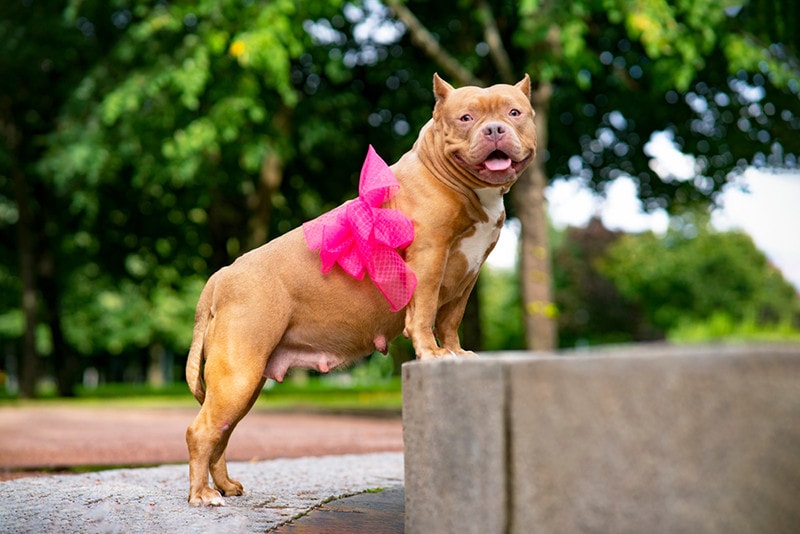Pitbulls are known for their strength and loyalty, but did you know they can also be incredibly fertile? These powerful dogs have the ability to conceive multiple times throughout their lives, leading to our question: how many times can a pitbull get pregnant?
The reproduction cycle of a pitbull is similar to other dog breeds. On average, a female pitbull can go into heat around twice a year, with each heat cycle lasting for about three weeks. During this time, she is ready to mate and can become pregnant. However, it’s important to note that responsible breeding is crucial for the well-being of both the mother and the puppies. Overbreeding can lead to health problems and increases the risk of genetic disorders. It is recommended to consult with a veterinarian to ensure the best care for these beautiful dogs.
Pitbulls can get pregnant multiple times throughout their lives. On average, a pitbull can have a litter of puppies once or twice a year. However, the number of times a pitbull can get pregnant can vary depending on factors such as age, health, and breeding practices. It’s important to consult with a veterinarian for guidance on proper breeding and reproductive health for your pitbull.

How Many Times Can a Pitbull Get Pregnant?
Welcome to our comprehensive guide on pitbull pregnancy! If you’re a pitbull owner or considering breeding pitbulls, understanding their reproductive cycle is essential. In this article, we will delve into the topic of how many times a pitbull can get pregnant, exploring factors such as their breeding age, heat cycles, and best practices for responsible breeding. So, let’s get started and gain a deeper understanding of pitbull pregnancy!
Factors Affecting Pitbull Pregnancy
Before diving into how many times a pitbull can get pregnant, it’s crucial to familiarize ourselves with the factors that can influence their reproductive capabilities. Several key elements impact a pitbull’s breeding potential, including their age, overall health, nutritional status, and the frequency of heat cycles. By considering these factors, we can make informed decisions and provide the best care for our pitbulls.
1. Pitbull Age and Reproduction
A pitbull’s age plays a significant role in their ability to get pregnant. Generally, female pitbulls reach sexual maturity between the ages of 6 to 12 months. However, it is advisable to wait until they are at least 18 to 24 months old before breeding them. This allows them to fully mature physically and emotionally, reducing the risk of complications during pregnancy and delivery. Breeding a pitbull too young can not only impact their health but also negatively affect the health of their offspring.
On the other hand, male pitbulls can start breeding as soon as they reach sexual maturity. It’s important to note that early or excessive breeding can lead to physical strain on the male pitbull’s reproductive system. Therefore, it’s recommended to allow male pitbulls to reach at least 12 months old before initiating breeding.
2. Heat Cycles and Breeding Frequency
Understanding the heat cycle of female pitbulls is crucial when considering how many times they can get pregnant. Pitbulls typically experience their first heat cycle between 6 to 12 months of age, but this can vary. The heat cycle, also known as estrus, is the period of receptiveness to mating and can last for approximately three weeks.
During this time, female pitbulls typically ovulate, which is the fertile period when they can get pregnant. Once the heat cycle ends, a female pitbull will typically go through another cycle within a few months. It’s important not to breed female pitbulls during every heat cycle to ensure their well-being. Breeding them during every cycle can lead to physical strain and potential health issues. Responsible breeders often wait until the third or fourth heat cycle before initiating breeding.
3. Health and Nutrition for Successful Pregnancy
Prioritizing the health and nutrition of your pitbull is crucial for successful pregnancies. Both male and female pitbulls should undergo regular health check-ups to ensure they are in optimal condition for breeding. A veterinarian can conduct tests and evaluate their overall reproductive health, addressing any potential concerns.
Nutrition also plays a vital role in supporting a pitbull’s reproductive capabilities. A balanced and high-quality diet, specifically formulated for breeding dogs, provides the necessary nutrients for a healthy pregnancy. Supplements such as folic acid, omega-3 fatty acids, and minerals like calcium and zinc can also support reproductive health in pitbulls.
Responsible Breeding Practices
When it comes to breeding pitbulls, responsible practices are of utmost importance. Not only does this ensure the well-being of the dogs involved, but it also preserves the breed’s integrity and contributes to a healthier pitbull population. Here are some essential tips for responsible pitbull breeding:
1. Find a Reputable and Responsible Breeder
Before considering breeding your pitbull, it’s essential to find a reputable and responsible breeder who has experience in breeding pitbulls. A reputable breeder will prioritize the health and welfare of their dogs over profit. They will conduct health screenings, provide proper care, and ensure the potential parents have desirable traits.
2. Health Screening and Genetic Testing
Health screening and genetic testing should be an integral part of the breeding process. Both the male and female pitbulls should undergo thorough examinations to rule out any underlying health issues or genetic disorders. This helps minimize the risk of passing on hereditary diseases to the offspring.
3. Prepare for Pregnancy and Whelping
Proper preparation for pregnancy and whelping (the process of giving birth) is crucial to ensure the safety and well-being of the mother and her puppies. Create a warm, quiet, and clean whelping area where the mother can comfortably give birth and care for her puppies. Have necessary supplies ready, such as clean towels, heating pads, and a whelping box.
4. Consider the Welfare of the Breed
Responsible breeding also involves considering the overall welfare of the pitbull breed. Breeding should focus on improving the breed, eliminating genetic diseases, and promoting healthy traits. Breeding should not be done solely for financial gain or popularity.
5. Provide Proper Care and Socialization
After the puppies are born, proper care and socialization are crucial for their well-being. Ensure the puppies receive appropriate veterinary care, vaccinations, and early socialization to prepare them for their future homes. Responsible breeders often stay in contact with puppy buyers, providing support and guidance throughout the dogs’ lives.
6. Avoid Overbreeding
Overbreeding pitbulls can have detrimental effects on their health and the overall pitbull population. It’s important to limit the number of pregnancies a pitbull goes through to avoid physical strain and potential complications. Responsible breeders carefully plan breedings and prioritize the well-being of their dogs.
Conclusion
Understanding the factors that influence pitbull pregnancy is essential for responsible breeding. By considering a pitbull’s age, heat cycles, and overall health, breeders can make informed decisions and ensure the well-being of their dogs. Responsible breeding practices prioritize the health and welfare of the dogs involved and contribute to a healthier and happier pitbull population. Remember, always consult with your veterinarian and educate yourself on proper breeding practices before embarking on a pitbull breeding journey.
Key Takeaways: How Many Times Can a Pitbull Get Pregnant?
- Pitbulls can get pregnant multiple times throughout their lives.
- A healthy adult pitbull can have a litter of puppies once or twice a year.
- The ideal breeding age for pitbulls is between 1-5 years old.
- It is important to provide proper care, nutrition, and veterinary check-ups during pregnancy to ensure the health of the pitbull and her puppies.
- Breeding should be done responsibly to prevent overpopulation and ensure the well-being of the breed.
By following these key takeaways, you can have a better understanding of how many times a pitbull can get pregnant and the importance of responsible breeding practices.
Frequently Asked Questions
Welcome to our FAQs section about pitbull pregnancies! Here, we aim to answer some common questions you may have regarding how many times a pitbull can get pregnant. Read on to find the answers you’re looking for!
1. At what age can a pitbull get pregnant?
A female pitbull can generally become pregnant starting at around 6 to 9 months old. However, it’s important to note that it’s best to wait until she reaches maturity, which is typically around 2 years old, before allowing her to breed. Breeding at too young an age can result in health complications for both the mother and the puppies.
It’s always a good idea to consult with a veterinarian to determine the best time for your pitbull to breed and ensure she is in optimal health for the pregnancy and delivery.
2. How many times can a pitbull get pregnant in her lifetime?
A female pitbull can potentially get pregnant during every heat cycle she experiences throughout her lifespan. Pitbulls typically go into heat every 6 to 8 months, and their heat cycles typically last around 2 to 3 weeks. So, depending on the length of her breeding years, a pitbull could potentially get pregnant multiple times over her lifetime.
However, it’s important to consider the health and well-being of the dog before allowing her to have repeated pregnancies. Breeding a dog too frequently can lead to physical and emotional strain, so it’s crucial to consult with a veterinarian to determine the best breeding and resting schedule for your pitbull.
3. How many puppies can a pitbull have in one litter?
The number of puppies a pitbull can have in one litter can vary. On average, pitbulls typically have a litter size of 5 to 10 puppies. However, it’s possible for a pitbull to have fewer or more puppies, as each dog is unique.
It’s important to note that the size of the litter can also depend on factors such as the health and age of the mother, genetics, and the care provided during pregnancy. Regular veterinary check-ups and proper nutrition are key to ensuring a healthy and successful pregnancy for your pitbull.
4. How long is the gestation period for pitbulls?
The gestation period for pitbulls is approximately 63 days, which is similar to other dog breeds. It’s crucial to keep track of the breeding dates to get an accurate estimate of when your pitbull would be due to give birth.
During the gestation period, it’s important to provide your pitbull with a nutritious diet, regular exercise, and a comfortable and stress-free environment to support her throughout this crucial time.
5. How soon after giving birth can a pitbull get pregnant again?
After giving birth, it’s generally recommended to wait at least 2 to 3 months before allowing a pitbull to become pregnant again. This resting period allows the mother’s body to recover fully and regain its strength before going through another pregnancy.
Overbreeding a dog without giving her enough time to rest and recover can lead to serious health issues. It’s essential to prioritize the well-being of the mother before considering breeding her again, and consulting with a veterinarian is always advisable to ensure a safe and healthy breeding schedule.

How many times can a dog get pregnant?
Summary
Pitbulls can get pregnant multiple times in their lifetime. However, it is essential to consider the health and well-being of both the mother and puppies. Pitbulls should not be bred excessively as this can lead to complications and health issues. Responsible breeding practices, including proper care and spacing between pregnancies, are crucial. It is always best to consult with a veterinarian to ensure the health of your pitbull and make informed decisions about their reproductive capabilities.
